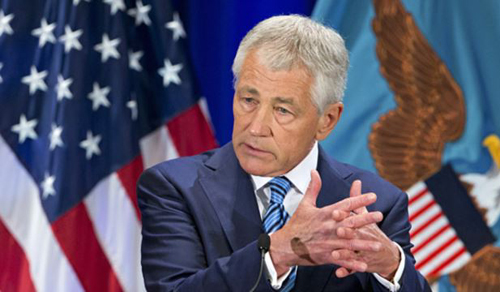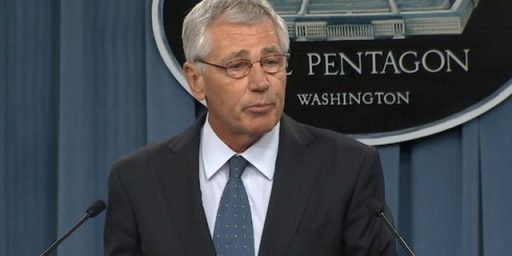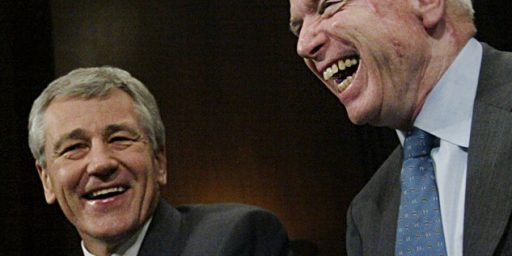The Hagel Doctrine
My latest for The National Interest, "Hagel's Three Questions," ponders our national security decisionmaking.
Near the beginning of his first public policy address as defense secretary, Chuck Hagel told the assembled military officers,
As you move onward and upward in your careers, I would urge you to always keep three questions in mind before making a decision:
● Does this help protect national security?
● Is this in America’s strategic interests, which includes the political, economic, and moral dimensions?
● Is this worthy of the service and sacrifice of our men and women in uniform, and their families?
In my latest for The National Interest, “Hagel’s Three Questions,” I ponder how well our nation’s civilian leadership has followed that sage advice. My conclusion:
Despite ending his address by proclaiming “America does not have the luxury of retrenchment” and can “make a better world for all people with its power,” my sense is that Hagel actually asks himself those three questions when deciding to commit American tax dollars and, more importantly, American lives. Indeed, he argued that the process must be guided by “a principled realism that is true to our values” and while acknowledging the military is “an essential tool of American power,” he cautioned it “must be used judiciously, with a keen appreciation of its limits.”
But Hagel is part of an administration that’s continued a bipartisan proclivity for military intervention and nation building that has dominated since the end of the Cold War. To be sure, President Obama opposed the Iraq War when he was a mere Illinois state senator, displaying a prescience that neither his vice president, either of his secretaries of state, Hagel, nor myself possessed. But he doubled down on a mission in Afghanistan that was obviously unachievable and launched a war in Libya while ostensibly “leading from behind.”
Then again, he has thus far avoided intervention in the Syrian civil war, avoided being goaded into military action to preempt Iranian nuclear capability, and stayed cool during the latest temper tantrum by North Korea’s child dictator. Let’s hope these decisions, plus the choice of Hagel to lead the Pentagon, signal that Obama is at heart a strategic realist. Hagel should raise those three questions at every turn as the administration shapes our defense priorities and considers those options that never seem to be off the table.
Much more at the link.






A quibble: Total agreement with you on Afghanistan but he could not have “launched” a war that was already ongoing by the time the US got involved. Far more correct to say, “Obama initiated US involvement in an ongoing civil war in Libya in a minimalist fashion.” or something to that effect.
Not saying I think he was right (or wrong for that matter) just that when discussing these things, it is important to describe them accurately.
Two points. First, I think the granularity of the decision is important. It makes sense to apply his “three questions” at the level of decisions on grand strategy or, perhaps, strategy. But not necessarily at the tactical level. Decisions of grand strategy, to the extent that they’re ever made at all, are made by elected officials and their appointees, not military officers, even general officers. That’s largely true of strategic considerations as well. That’s decided in the political sphere, not by the military.
Second, I think that concrete case studies would be interesting in this regard. Rather than debating highly contentious recent actions inevitably seen too much through the prism of domestic politics, think about the bombing of Kosovo. How do SecDef Hagel’s three questions apply to that instance? Or the “No-Fly Zone” in Iraq maintained for most of the 1990s?
Those are three great questions. The concern, of course, is how the likes of Hagel will answer them. That’s where the potential if not the severe probability arises of an idiotic set of decision points, if not full-fledged Chamberlain syndrome. So we’ll just have to wait and see what happens. It’s difficult to be all that optimistic.
If George Bush, Richard Cheney and Donald Rumsfeld had asked these questions and answered them truthfully, a lot of lives and money world have been saved. Republicans in the last 10 years have adopted an ideology that doesn’t make sense, and is not compatible with reality, which says that America have to increase defence spending to ridiculous levels and constantly show its military might in order to have security at home.
James, who calls himself a foreign policy wonk knows that this ideology has completely failed and was stupid in the first place. So, why do you still insist on supporting republicans, James?
@Dave- You are confusing what should happen with what is happening. One of our problems in our recent wars was deferring strategic decisions to our military. If we are going to put them in that position, we need to at least make young officers think about the issues.
Beyond that, I think officers need to be aware of our strategic interests even if they are not developing the strategies. Torture has not ever been in our strategic interest. Making officers think about spending is important.
On Kosovo and Iraq, I think you can arguments for both that the answers to his three questions hold up fairly well, but even there I am not sure that can be done w/o that prism kicking in.
Steve
@steve:
I do not believe that the DoD made the decisions to repel Saddam Hussein’s forces from Kuwait, maintain the “No-Fly Zone” over Iraq, bomb Serbia, bomb Kosovo, invade Afghanistan, invade Iraq, or assist in the air campaign that was instrumental in removing Qaddafi. I think those were all decisions made by the political powers.
As far as individual weapons systems go, yes, military officers lobby for them. That’s why I maintain that we’re in desperate need of reducing the number of general officers. The Congress doesn’t need to listen to that lobbying or do what the generals want them do. They support weapons systems we don’t need for their own reasons. Re-election, mostly.
Oh, you must mean like the Iraq disaster, one of, if not the worst foreign policy debacle in American history…
This rather tired cliché has been completely misused to try to justify idiotic decision points time and time again…
Here is another question that Secretary Hagel needs to ask the military,and the president if necessary: What is your plan to win and what is your exit strategy? Actually two questions but always should be connected.
“No terms except unconditional surrender” General Grant
If Grant and Sherman (total war) were still around, we could win any war.
@Tyrell: Yes Tyrell burning down entire cities so that the residents are killed, possessions destroyed, and many later dying of exposure and disease is what we should aspire to. Idiot.
The is problem is that I am pretty sure that the Bush Administration asked just these three questions at the start of the Iraq War- and answered all of them in the affirmative. The ideology of the people asking the questions is going to dictate the answers to those questions. The problem was not that the Bush Administration asked the wrong questions-the problem is that the Bush Administration believed the wrong things about Iraq.
I think that James is concerned about creating a formal doctrine to govern US foreign policy, and in particular, foreign military interventions. He wants this doctrine to be based on “strategic realism” , as practiced by Saint Ron, George Bush, Scowcroft, Eagleburger, etc ( There were foreign policy giants in those days!)
Leaving aside whether “strategic realism” would be a good descriptor of Reagan -Bush FP( I would say No), I’m not sure that “strategic realism” would be a good framework for US foreign policy-or that it should have a frame at all. Obama seems to eschew such frames in his foreign policy making. He seems to judge each situation on its merits and his vision seems to be “Lets do good- but let’s count the costs and let’s be willing to get out if its clear we are not doing good. ” IOW, no wars, but smart wars -and wars limited to what we can reasonably accomplish and what’s good, according general principles of international law.
There was no such thing as TV or the internet in those days, the carnage was out of sight, out of mind.
JJ he reinforced in Afghanistan to avoid a developing debacle. The double down had already in fact been initiated by Bush. Either way we’re now back down to around 65,000 men and are engaged in the end run to get out of there. And your suggestion that the administration “launched a war in Libya” is so preposterous I really wonder whether you think it adds to your reputation as a commentator on international affairs. The administration is clearly in liquidationist mode and has no interest in getting engaged in further middle eastern adventures except in a very el cheapo way via proxies. And behind this are some political and economic realities. Hagel is going to have less money to spend as a consequence of administration cuts and the sequester; the army is pretty well worn down; and the public mood does not favor starting new wars with rather indeterminate goals.
@Brummagem Joe: It’s just not true on Afghanistan: Bush had a very small footprint force. Obama declared it a “necessary war” and conducted a surge, at the cost of thousands of American lives, to zero gain in US national security.
My general sense is that Obama is indeed a Realist. But there was little gain from the LIbya operation which, despite pretense of “leading from behind,” was mostly a US op. On Syria and Iran, he’s thus far played it about right. My only quibble is his constant jabbering, mostly through Susan RIce, John Kerry, and others, that suggests we’re “THIS CLOSE” to launching war for no apparent gain to US national security.
We cannot afford nation-building from here on out for some time to come. Not at the levels of Iraq or Afghanistan, anyway. We must not incur the casualties these adventures have cost us either with no gain in security to rave about.
But, we must maintain a significant military force ready to go to war if needed. In fact, it should be a superior force that no one would want to face, but we seem to be letting that objective slide ever so gently downhill and gain speed.
These days, a second-rate nation militarily, but rich in manpower, can assemble a formidable force in a matter of a few years, with help from the Russians, who are delighted to sell their hardware worldwide. Case in point is NK
@James Joyner:
The increase in troop deployments authorised by Bush right at the end of his presidency and and further increased by Obama wasn’t about “national security” it was about containing a deteriorating tactical situation on the ground which it did. This is all a matter of public record so I’m at a loss as to why you keep claiming otherwise. As to the assertions that the Libyan operation constituted “launching a war” or was even mostly a US op…they are so at odds with reality I can’t take you seriously. There was a popular uprising in Libya which was dragging on and Ghadaffi was going to use airpower to suppress. Nato particularly in the shape of France and to a lesser extent Britain decided to impose a no fly zone and got some surveillance assistance from the US who did not participate in the actual air patrols and the cost to us was essentially zero. And the US never expected any major “gains” from our modest participation in this fairly minor operation which was really about preventing a murderous little dictator, who btw was responsible for the deaths of numerous Americans, from killing his own people. Sorry JJ you’re allowing your apparent animus against the Obama administration’s foreign policy to harm your reputation for probity and a sense of proportion.
@Brummagem Joe:
http://news.bbc.co.uk/2/hi/7895951.stm
@Brummagem Joe:
http://www.bbc.co.uk/news/world-africa-12672640
@Brummagem Joe:
http://articles.washingtonpost.com/2009-02-18/news/36887782_1_nato-troops-army-s-5th-stryker-brigade-afghanistan
@Tyrell: More important than “what is your plan for winning” is the question “how do you define winning?” You can’t win a fight if you don’t know what your objectives are.
@Brummagem Joe: This isn’t about Obama but rather a bipartisan consensus going back to the Bush 41 administration towards nation building.
I’d actually forgotten about the mild boost in troop strength in February 2009. I was referring to the “Afghan Surge,” which took place well into the Obama administration and after Gates fired McKiernan as ISAF commander, replaced him with McChrystal, and then decided on a massive increase in forces. (I was also critical of McChrystal for “leaking” his report to the president and helping engineer said surge though the media.)
I’m not arguing that the war in Libya was Obama’s doing. I’m saying that 1) the intervention of the United States into said war was Obama’s doing and that 2) Obama did his best to give the impression that the US was in a supporting role in a UN/NATO intervention when, in reality, the US did the heavy lifting throughout UNIFIED PROTECTOR. Even after the initial wave of precision bombing, when the US took a back seat in “combat sorties,” the reality was that the US was flying almost all the SEAD (Suppression of Enemy Air Defense), air-to-air refueling, and other vital missions simply because only we have that capacity.
My assessment of Obama’s foreign policy is generally two-fold. First, I think he’s more-or-less a Realist in the tradition of most American presidents of recent decades, with Carter and Bush Jr as the exceptions. Second, I think he’s largely a foreign policy amateur, as has been the case with most recent presidents aside from Bush Sr.
With regard to three questions, SECDEF doesn’t call the shots — it’s POTUS’ call. Bush the Younger protected himself by fomenting the fiction that Rumsfeld, Chaney and Wolfowitz were running the show. After four years Obama finally figured out that’s how Bush played it and survived despite comitting grave errors.; in bringing in Hagel as a trusted simpatico adviser who can assume the reins, Obama is following the Bush model of distancing himself, on the surface at least, from strategic decisions. When a POTUS does that things tend to not turn out very well.
I trust Hagel’s judgment more than that of Obama who knows nothing of military service. Just this morning General Dempsey indicated a possible need for an American military presence in Afghanistan beyond 2014. Hopefully Hagel will stop the endless waste of blood and treasure in Afghanistan because I suspect Obama doesn’t have the courage to say no and get us out of Viet Nam redux.